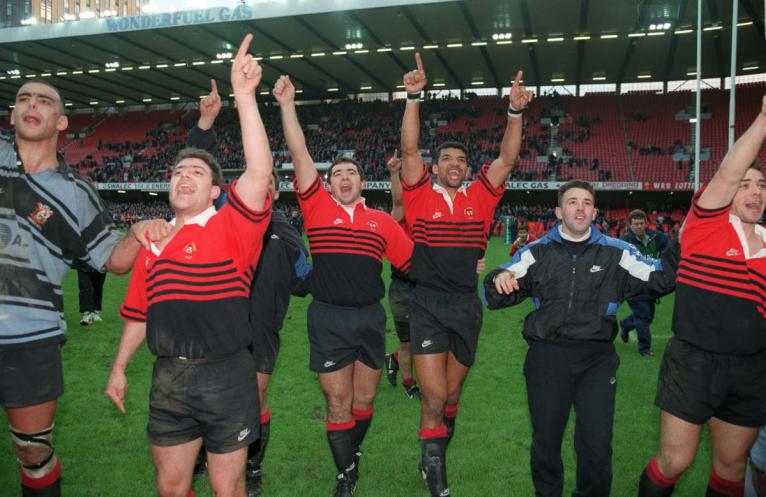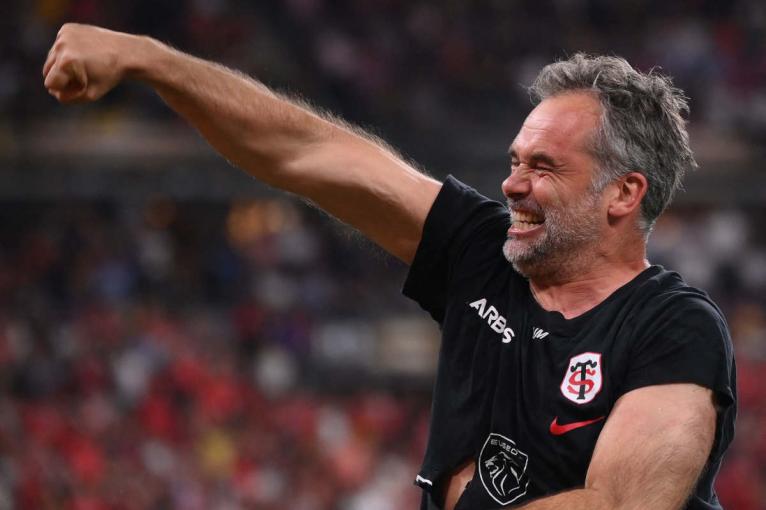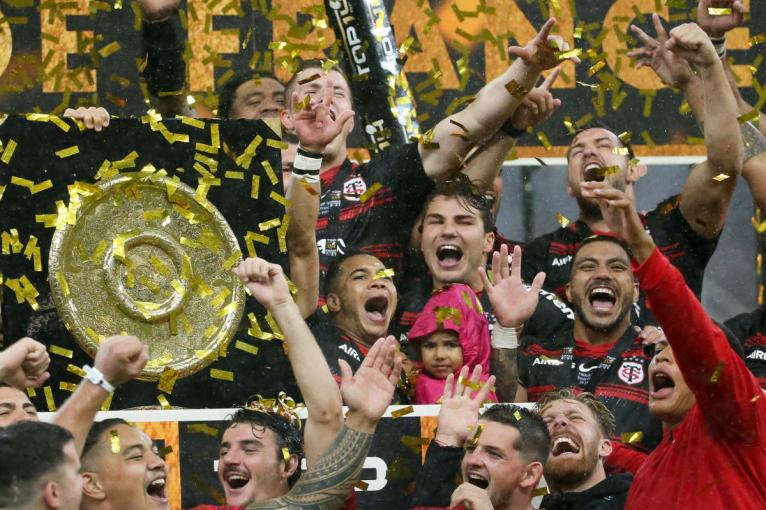One of professional rugby’s more remarkable statistics concerns Europe’s most successful club of the last three decades. Since the 1995-96 season, Toulouse have appeared in seven Champions Cup finals and won five of them; they’ve also racked up 10 Top 14 titles and on two occasions they’ve achieved a European and domestic double.
It is a phenomenal feat in the world’s toughest domestic league and one that no other French club has come close to challenging. But the most astonishing aspect of Toulouse’s success is the fact that in those 29 years they’ve employed only two head coaches. The first was Guy Noves, who reigned from 1993 to 2015 before he was replaced that year by Ugo Mola, a former winger with Les Rouge et Noir who played under Noves in the 1990s.
Of the other eye-catching French clubs this century – Clermont, Toulon, Stade Francais, Montpellier, Racing 92, Castres and La Rochelle – only Toulouse have never had a foreign head coach. Like the national side, Toulouse believe that that role belongs to a Frenchman. And not just any Frenchman, but one who has played for the club.

The same principle applies in the boardroom. René Bouscatel, president of Toulouse from 1992 to 2017, played for the club in his youth, as had his predecessor (Christian Massat) and his successor, Didier Lacroix.
In another club this might have laid them open to a charge of parochialism, but not in Toulouse. The club, like the city, is broad-minded. Toulouse, with a population of half a million, is the most cosmopolitan metropolis in France after Paris. It has a thriving student population and is also the headquarters of Airbus, whose 30,000 employees come from around the world to live in the ‘Pink City’, its nickname on account of the colour of its buildings.
Perhaps this in part explains why Toulouse are the only French club who have consistently treated the Champions Cup as seriously as the Top 14: they recognise the prestige in being crowned European champions in a way other more narrow-minded French clubs don’t.
Toulouse’s first European title was in the competition’s inaugural season – 1995-96 – and more followed at regular intervals: 2003, 2005 and 2010, as well as defeats in the 2004 and 2008 finals.
The club had for years been the embodiment of the ‘French flair’ cliché. Their rugby was bold, innovative, daring and exciting. Not in the 2010s. It was laborious and unadventurous.
That was the period when Toulouse under Noves were ahead of their European rivals in fitness, technique and recruitment. They have never been recklessly extravagant in the transfer market, but their overseas signings were canny: Trevor Brennan, Byron Kelleher, Finau Maka, Daan Human and Shaun Sowerby were the standouts in the first decade of professionalism. With the exception of All Black Kelleher, none were rugby superstars when they arrived at Toulouse, but they all turned into vital club cogs.
But gradually Toulouse’s rivals began to catch up. Noves, growing a little old and a little complacent, failed to spot them in his rear-view mirror. In the 2010s Toulouse were overtaken by Leinster, Saracens, Exeter, Racing, Clermont and Toulon.
Toulouse didn’t win a trophy between 2012 and 2019; they didn’t even reach a final. Worse, they betrayed their rugby heritage. The club had for years been the embodiment of the ‘French flair’ cliché. Their rugby was bold, innovative, daring and exciting. Not in the 2010s. It was laborious and unadventurous. They won the 2012 Top 14 title without scoring a try in either the semi-final or the final.

It wasn’t just on the field where Toulouse were struggling. Unlike most of their French rivals, Toulouse have never relied on the millions of a wealthy owner. The club is 48% owned by the Stade Toulousain Rugby Association, 25% by the association Les Amis du Stade Toulousain, which owns the Stade Ernest-Wallon, 12% by the international accountancy company Fiducial (the largest private shareholder) and the remainder by small shareholders.
In 2013 Toulouse began losing around €1.5 million a year as a result of the closure of the city’s major sports stadium. Toulouse had played four matches a season at the venue, which had twice the capacity of the 19,000 Stade Ernest-Wallon, but it spent two and a half years undergoing refurbishment before it hosted some matches at the 2016 European Football Championships.
It was unfortunate for Toulouse that this period coincided with the final years of Noves’ reign. He already knew he would replace Philippe Saint-Andre as coach of the national team and neither Noves’ head or his heart were at Toulouse between 2013 and 2015.
If Noves had outstayed his welcome, so had president René Bouscatel who, like the head coach, had been in his post since the early 1990s. The world had changed and both men were struggling to adapt.
Toulouse’s Argentine lock Patricio Albacete gave an explosive interview to L’Equipe in which he said: “Replacing a manager like Guy Noves…has not been easy. The suit was perhaps too big for him [Mola]. He hasn’t the shoulders to take on a squad like that.”
Noves left Toulouse in the summer of 2015 for a brief but disastrous spell in charge of France (he was forced out by the FFR in December 2017). Bouscatel was replaced as president in 2017 by Lacroix.
That season Toulouse hit rock-bottom. They finished 12th in the Top 14, failing to make the play-offs for the first time in 41 years. Average attendances at the Stade Ernest-Wallon dropped from 19,000 to 14,000, and season ticket-holder numbers fell by 7%.
Toulouse’s plight came to the attention of France’s business newspaper, Les Echoes, which in its edition of April 27, 2017, ran a lengthy article explaining why the most successful club of the recent era was in trouble.
The paper’s focus naturally was the economic aspect, but Les Echoes also described their on-field problems under the inexperienced new coach, Ugo Mola. “Mola has not managed to put the house in order,” stated the paper. “With one year left on his contract, it is not certain that he…will be retained. It is even rumoured that, for the first time, the next coaches may not come from within the club’s ranks.”

Les Echoes wasn’t alone in suggesting Mola wasn’t up to the task. A month later Toulouse’s Argentine lock Patricio Albacete gave an explosive interview to L’Equipe in which he said: “Replacing a manager like Guy Noves…has not been easy. The suit was perhaps too big for him [Mola]. He hasn’t the shoulders to take on a squad like that.”
Albacete was gone a short time later, shown the door by Mola, along with most of the Toulouse old guard: Grégory Lamboley, Thierry Dusautoir, Census Johnston, Gurthrö Steenkamp and Luke McAlister. The problem wasn’t Mola; it was the legacy of Noves, and a squad in a comfort zone.
“The mistake I accept is that we had too many players coming to the end of their careers,” conceded Bouscatel in one of his last interviews. “But with Guy Noves, we had a policy of long contracts so that players would make a career with us.”
The coaching staff have given the younger boys not just an opportunity but also the freedom to go and show what they can do.
Mola also got rid of some younger players whom he considered incompatible to his rugby vision; they included Yacouba Camara, Christopher Tolofua, Alexis Palisson and Samuel Marques. In the years since, none have shown Mola to have been wrong in his judgement.
In their place Mola looked to the club’s strong youth academy, which included at this time Julien Marchand, Peato Mauvaka, Francois Cros, Romain Ntamack and Lucas Tauzin.
He also made two signings in early 2017 which will forever rank among the most inspired in the history of the Top 14. One was a relatively unknown South African winger called Cheslin Kolbe, who had grown tired of being denied recognition in his own country; the other was a promising young scrum-half from Castres called Antoine Dupont.

I interviewed Kolbe a few months into his debut season with Toulouse and he told me: “A lot of senior guys left last year and that made a big change. The coaching staff have given the younger boys not just an opportunity but also the freedom to go and show what they can do.”
The following year, 2018-2019, I heard a similar assessment from Dupont, Thomas Ramos and Romain Ntamack, when I interviewed them together. “We’ve been developing a style of rugby in recent years that is now bearing fruit,” said Dupont. “We’ve also recruited intelligently, signing players who fit easily into the style we’re trying to achieve. In the backline we’re all attack-minded. We want to get our hands on the ball and we will counter-attack whenever we can.”
A month later Toulouse beat Clermont in the Top 14 final for their first silverware since 2012. In 2021 they accomplished the European and domestic double and last season they added another Bouclier de Brennus. They are well positioned to repeat that extraordinary feat this season.
Financially, Toulouse have also recovered from the turbulence of a decade ago, despite the economic crisis that has swept Europe since 2020. Didier Lacroix must claim a lot of credit.
The 33,000 tickets for Sunday’s Champions Cup semi-final against Harlequins at the city’s main sports stadium were sold out in 20 minutes when they went on sale online. The club subsequently revealed that they had received 800,000 online connection requests about tickets for the game.
In 2014 there were rumours that Airbus was thinking of ending its association with Toulouse but in 2018, not long into Lacroix’s presidency, the aviation giant doubled its commitment to €2m. As much as the money, it’s the cachet that comes with having a major commercial partner such as Airbus. The same goes for Peugeot, who last year extended their relationship with Toulouse for another four years.
Last December the club opened its Grand Café in the heart of Toulouse, a stylish brasserie adorned with portraits of the city’s rugby greats. It’s part of Lacroix’s strategy to strengthen ties between the club and the city, which is clearly working.
The 33,000 tickets for Sunday’s Champions Cup semi-final against Harlequins at the city’s main sports stadium were sold out in 20 minutes when they went on sale online. The club subsequently revealed that they had received 800,000 online connection requests about tickets for the game.
Plans are afoot to expand the capacity of the Stade Ernest-Wallon from 19,000 to 25,000, a project scheduled to begin in 2027. In this week’s Midi Olympique, Lacroix explained more about his ambitions to build the Toulouse brand across Europe, boasting that this season the club “is in the process of beating all records at every level: in store shirt sales, online merchandising and ticket sales.”
In its architecture, in its finances and in its rugby, Toulouse is in the pink.


Maybe if you come once in your life in France you won’t writte so much nonsense 🙃
Explain please?